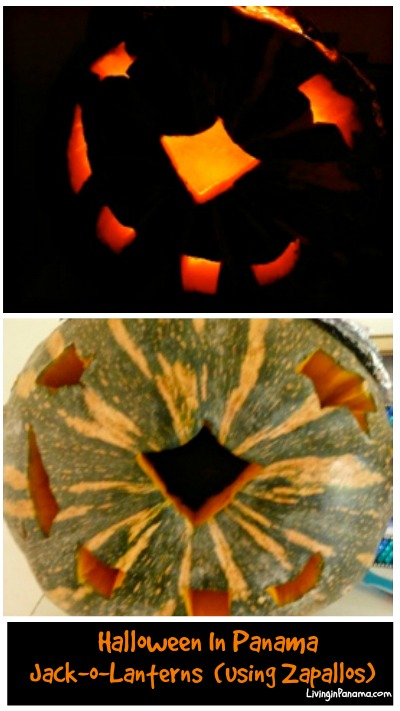
Halloween isn't really celebrated in Panama.
Schools sometimes have costume contests. In places with more Americans, there are some festivities.
For instance, the Multi-plaza Mall in Panama City has trick or treating and a costume party every year. I've never been, but according to Chris at PanamaForReal.com, it isn't the most scintillating event. But it is an event.
The more American residential enclaves in the city also have trick or treating, but it is for residents only.
This year in Boquete there is a Halloween party at Skate World. They are going to have 2 events, one for kids and one for teens. Having one in each category myself, I applaud that idea.
There may be something at Chiriqui Mall in David, but I am not sure about that.
In towns with few Americans, there are no events.
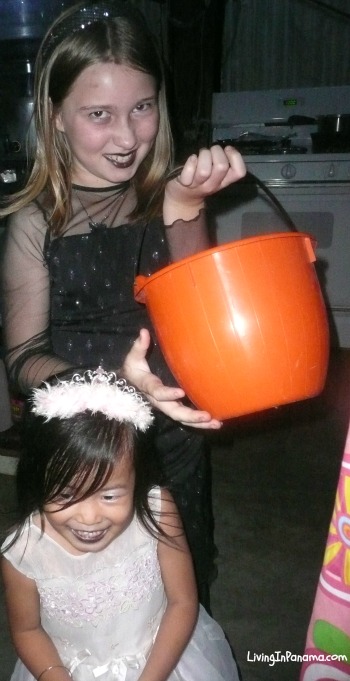
Over the years we have tried our best to create our own Halloweens.
I love carving pumpkins. I love the way they are transformed at night when they are all lite up.
Unfortunately, Panama does not grow any pumpkins.
If you want to carve an actual pumpkin, Pricesmart often sells them around Halloween. They charge a pretty penny for them, but sometimes you just want one.
You can also use some of the many calabazas grown in Panama. A popular one, which is shown in the photo above, is called zapallo.
FYI: You really don't want to leave your carved pumpkin out too long, unless is it well outside. This is the tropics. If you leave food out, something or other will invade and start eating. You many not want what shows up for dinner in your house.
Some years we have Halloween parties. One year we even created a Haunted House.
It can be challenging to recreate the sense of excitement and anticipation of a Halloween in the States. This challenge is made even harder since none of our Halloween party-goers have ever been fellow Americans.
Recreating an event that mystifies most of the participants, is not an easy task. The people who come to our Halloween parties are mostly Panamanians with a German or two in the mix. However, our German friend really embraced the concept of the Haunted House and greatly improved the one we had.
Most kids in Panama are fantastic at the candy grab. Years of birthday party pinatas and candy thrown from parade floats have made kids here very skilled in the art of grabbing as much candy as possible as quickly as possible.
As my daughter says about candy and pinatas
"It is war. And it is fun. You try to grab as much candy as possible, but no one holds a grudge after"
But trick or treating is different. The candy grab instinct can be hard to quell.
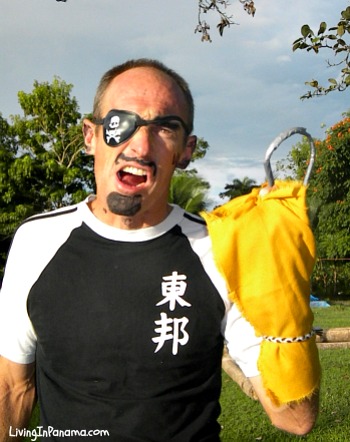
For trick or treating, the adults usually take up stations in various rooms in our house. Then the kids knock at each door and say trick or treat. Even after reminding kids to take only 1 or 2 candies, the kids, especially the younger ones, grab as big a handful as possible. But they tend to quickly get with the program.
We try to make the kids wander around, go up and down stairs and around for trick or treating. To make it more interesting, the adults try to change costumes for each circuit of trick or treating.
My husband likes to lay scary traps for them while they trick or treat. He has a great time.
We also usually do some games like dunking for apples, telling mildly scary stories, and maybe a board game.
There isn't much post trick or treating candy exchange though. With everyone getting the same candy, and there is usually more candy in the closet, there is no point.
It isn't the same as Halloween in the States. There is no of the gang of kids in the dark laughing and running from house to house. No anticipation of what the next house will give out, of what scary thing they may have in their yard.
But the kids love it. It isn't the full experience. But it is Halloween.
In the end they score alot of candy. Which for kids is always a highlight. .
Trying to recreate Halloween is great fun. It will also help kids feel less like a fish out of water when they visit their cousins and friends in the States. Especially now with Halloween becoming one of the most celebrated holidays in the US.
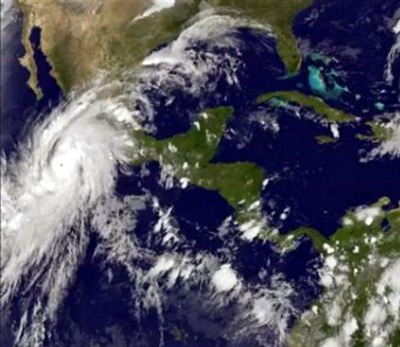
Not surprisingly, we have gotten a number of concerned inquiries in the wake of Hurricane Patricia, and the long news blitz that has followed. The weather folk said it might hit Panama, but it was yet another hurricane that did not hit Panama.
We, too, had our own concerns about hurricanes and other tropical storms, before we arrived in Panama in 2006.
We were happy to learn that there is no recorded information of hurricanes ever striking land in Panama. This figure surprised and pleased us.
We have been in the country for over 8 years now, and we have yet to see or hear news of a hurricane striking land in Panama.
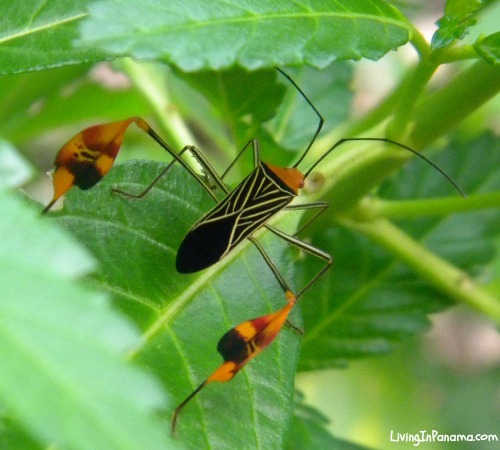
They are known as Flag-footed, or Leaf-footed bugs.
They come in many colors and sizes and live all over the world.
In North America they are known as the Squash bug.
Well, one of the cousins (the Anasa tristis) of the bug in video below is called that because they tend to infest squash plants.
[leadplayer_vid id="56297B30418DC"]
But most members of this species are found in the tropics and subtropics. I imagine that most of those are pretty colorful like the one in these photos.
The scientific name of the specific bug in these pictures and video is Anisocelis flavolineata. These bugs belong to the Coreidae family.
They have stink glands. But other than that, they are perfectly harmless.
The stink gland odor is not disgusting. And it isn't cloying like the spray from a skunk.
The bugs only release their stink when they are grabbed, in self-defense.
So watch these fascinating bugs, but don't touch.
Research Sources:
- Naturewatch.org
Back when our family lived full-time in Seattle, I found that my days, weeks, and months were consumed with work, errands, and the basic maintenance of a life with children.
I never had a moment free from a sense of “rushing from one thing to another”.
I know people who seem unfazed by this “reality” of life.
I guess they have a higher threshold for stress than I do. Or, perhaps, they are just better at “faking it”.
Whatever the case, I was suffering from a lack of time to just “be”.
Our family’s decision to move to Panama was one of taking a chance, and of giving up many of the great cultural and social benefits of living in a bustling, artistic, cultural center like Seattle.
In exchange, we got a slower-paced lifestyle in the small Central American town of Puerto Armuelles. It was a huge trade-off for us.
What we have found in our over 8 years of living in Puerto is that, while we had much more access to events, institutions, and community that inspired us in Seattle, we have much more of the most basic element of a happy, creative life here in Puerto Armuelles.
That is TIME.
TIME. Free, abundant, time.
Time in which to think, to read, to draw, to go for a walk on the beach, to stop in the midst of our morning routine to listen to the sounds of the parrots, the howler monkeys, or to the horses that go clopping by our house.
This is pretty basic stuff, really.
And it is oh so essential to one’s sense of well-being.
It is amazing how much peace one can find, simply by removing the unceasing pressure to keep moving, and doing, from every minute of every day.
When one can just breathe, and “be”, one is able to connect with the moment.
With this gift of time, I have discovered that my mind doesn’t go racing ahead to the next moment, as if driven by a tyrant. I can stay in one place, and be peaceful.

Since we started our 8-year adventure in Puerto Armuelles, our older daughter has become a teenager. She is very happy living in Panama. She considers it her home.
As her parents though, we half-reluctantly realized it is time for her to explore the more tangible advantages that life in Seattle has to offer. Puerto is a wonderful place to be, but it is a small town. It does not provide the wide array of learning opportunities and experiences of a city in the States.
Knowing our daughter, we felt she would be glad she had those opportunities as she grew older and made her own way in the world. Therefore, we decided to spend part of each year in Seattle, and part of each year in Puerto Armuelles.
We have been engaged in this experiment for about a year now.
I am happy to report that everything is going really well so far.
At first our older daughter, Skylar, was very homesick for Panama. Now she embraces living in both places. Our younger daughter, Blaise, is 9 years old. She is not as enthusiastic about living in both places. She would still prefer to be living full-time in Puerto Armuelles. She does enjoy Seattle, but she misses our more laid back life in Puerto Armuelles.
Skylar, now 14, participates in a variety of home school type programs in Seattle. She studies writing with a favorite teacher at one school. She takes an amazing and renown college-prep science class taught by a ex-college professor at another location. She helps in the costuming department of a local theater company and studies ballet and modern dance at the home of a ex-professional ballerina. She took sailing over the summer and wants to sail more. She is also on a soccer team and is taking guitar. It is a full schedule. And she has more things she still wants to explore.
Many of her classes are within walking, or biking distance of our home. However, we definitely spend more time in the car in Seattle than we do in Puerto Armuelles. And the traffic in Seattle is getting increasingly bad.
After one year, we feel more inspired in BOTH PLACES.
By getting to spend 6 months in Panama, we are not affected as much by the traffic congestion in Seattle, or by the long stretches of grey days.
Spending half the year swimming in the warm Pacific Ocean, makes it much more bearable to be surrounded by all those lakes and Puget Sound in Seattle that are all too frigid to bathe in.
Not being quite so amped up by a year-long stint in Seattle, we feel that we have more time to explore all that Seattle has to offer, and to enjoy it. We go to the ballet, we see musical performances, we visit art galleries.
In the same way, after all the business of Seattle, we luxuriate in all the time we have in Panama.
Time to explore life on our own timeline. Time to enjoy the abundant nature and wildlife all around our house.
We find it is only by having open ended time that you can really discover and explore your interests and what you want out of life. Too much business kills creativity.
I think this article could apply to other parents of young children who have considered taking a “time out” of their lives in North America.
But for those with grown children, the notion that Panama isn’t necessarily an “all or nothing” proposition might be appealing too
We meet many retirees who enjoy going back and forth between their northern homes, and a smaller, much less expensive home and lifestyle in Panama.
In fact, we know several northerners, particularly Canadians, who enjoy seeing family up north during the warm summer months, and then they head down to Puerto Armuelles to relax and stay warm during the cold season up north. A cold season which corresponds perfectly with the warmest, driest part of the year in Panama.
They say that they are re-invigorated by the change, so that they feel fresher in both places. When they catch up with old friends up north, or their new friends in Puerto, they have some new stories to share.
Living in both places is more expensive. Not only do you have to cover airfare, but life is much more expensive in North America and Europe. So that is something to consider before embracing life as a part-time expat.
For folks on a limited or fixed income, the time in North America might be spent traveling in a motor home, or staying with several different children.
This gives grandparents a chance to really connect with their grandchildren, maybe travel together. It also gives you the ability to help your grown children to go on a vacation without their kids, but watching your grandchildren.
Right now our part-time experiment is working for us. Although, my family has admitted to missing spending more time in Panama. It still feels strange not be in Puerto Armuelles.
My wife feels that life is more of an adventure in Panama. More leisurely, less planning. She loves that you can decide to go snorkeling or hike in the mountains in the morning and be actually doing it by the afternoon.
See my post on easily enjoying the beach and the mountains within 2 hours in Panama
Life is definitely more busy and involves more planning in the States.
They say that we become our habits, little by little, day by day. So I am glad we are mixing the habits we have in each of these two places together.
The habits of exploration, adventure, and enjoying each moment.
Please comment below.
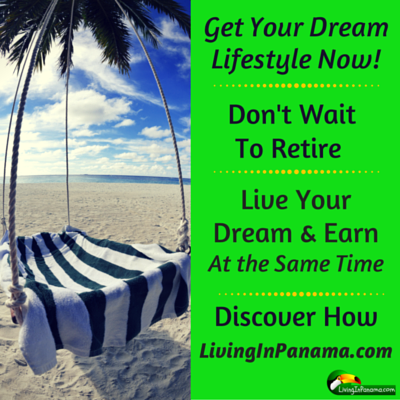
But don't move down here with no plan.
An "It will all work out" attitude is not enough. To be successful, you need to plan ahead.
What lifestyle do you want in Panama? You must think about this.
Often when people set up their life initially, they don't consciously think about the lifestyle they want. Typically, when starting out, people find the best paying job they can and buckle down to pay the bills.
Then life just happens, around your job.
Now you have a chance to start again.
Decide on your ideal lifestyle. Then find, or create, a job or business that fits that lifestyle.
Before you decide to pursue a job or business, evaluate how it will help you achieve your lifestyle goals.
At the very least, make sure it won't be a major obstacle to enjoying your ideal tropical lifestyle.
Job vs. Business
A job will give you a steady paycheck that you can rely on. That is, unless the job disappears for whatever reason. Of course, it is harder to get a good paying job in Panama.
I talk about ways to create your own job in Panama later on in this post.
Starting your own business can be much riskier. You may not make any money at first, or ever. But it is potentially more profitable.
A business will also take a lot more of your time, especially initially.
It will also mean you have to go out and hustle up business whether you have a
I talk more about starting your own business in Panama later on in this post.
Are you a job-type person or a business person?
Walking into a real, existing, job will get you that steady paycheck. Not a bad idea when you have those extra moving expenses to cover. It is also a great way to meet people in your new home.
There are a number of things to keep in mind when getting a job in Panama. I wrote a post that talks about those things in some detail.
Click here for 5 ways to find a real job in Panama.
Panama offers amazing opportunities to create an ideal job.
A job that allows you the freedom to enjoy your new tropical lifestyle.
The skill set of locals tends to be different from people from the West.
The answers to these 2 question will you figure out a good job to create for yourself.
One way to figure out what type of service is needed is to ask on local forums.
Ask what service they think their community is lacking. Float ideas yourself. Ask, do you think there is a need for _____.
Of course, you should visit for awhile before you decide to move.
While you are visiting is a prime time to do some research on local unmet needs.
Think about all the things you have done in your various jobs and hobbies over time. Things like office management, writing, photography, cooking, editing, fishing, design, plumbing, etc...
Based on the the answers to those two job creation questions above, you should have good idea of what you should be planning to do.
For example, offering services to expats is often successful.
If find a need for which you have the skill set, you have struck gold (or at least silver).
You can also create your own job inside of someone else's business. For instance, you could ask a hotel to hire you to give tours to tourists, or to be their in-house IT person.
There are many kinds of businesses you can create.
In this post, I am focusing on businesses you can create in Panama.
Of course there are many portable jobs and business you can start as well.
I will be talking about portable income options in a future posts. I am a big fan of making money from anywhere there is an internet connection.
In Panama, you cannot do any manual labor, unless you have a work permit, even in your own business.
So if you open a restaurant, you cannot be your own cook or waiter. Again, unless you have a work permit.
For 15 ways to get a work permit in Panama click here
Also, foreigners in Panama are not allowed to open a retail business.
We strongly advise against businesses that requires you to hire employees.
There is a whole host of issues and potential problems that come with hiring Panamanian employees. Maybe eventually you will feel brave enough to start a business with employees, but don't make it your first business.
Of course, using contract workers instead of employees could be a good option
Click here to read about hiring employees in Panama.
One of the easiest and fastest ways to make money quickly, is to teach English online. So if you need to keep the income coming in while you set up your business or other way to make money, it is a good option to explore. You can read about the ins and outs of teaching English online.
Have your work life figured out now?
Okay, now it is time to find some place to live.
You may want to check out our properties in Puerto Armuelles Panama.
Puerto Armuelles is a unique and charming beach town in the popular Chiriqui province. You can find out more about Puerto Armuelles.
You Can Find A Job In Panama, But It WIll Take Effort
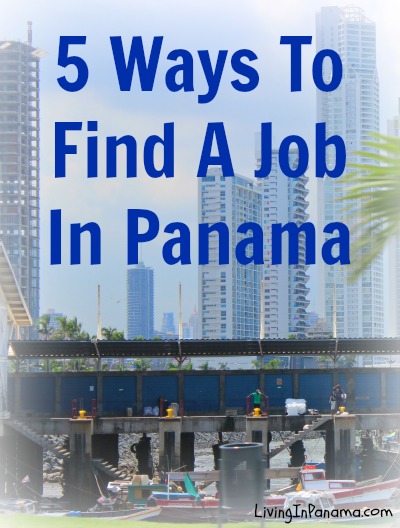
Keep it in mind though, in case your job search does not result in your dream job.
If you want a real job, one that you don’t create for yourself, your best bet is to:
Don't forget to tell everyone about your search for a job in Panama.
Especially if you get a just-for-now job, keep networking after you move to Panama. You will probably hear about many open positions through word-of-mouth.
This is the easiest way. Just do the job your doing, but on the beach.
If you are willing to shell out the cost of semi-regular plane trips to be in the office in person, it makes it much more likely.
Given the lower cost of living in Panama, you may end up making more money even with the plane tickets.
Why not ask?
I know people who do this. I even know people who do this for a business they own "back home".
Just ask, the worst that can happen is they say, no.
If you really want it, then address all the reasons for their no. Keep showing them their reasons are wrong (if you can) and they just might say yes.
Does your company have an office in Panama?
They may finally send you just to shut you up.
Yes, you can work in Panama for an international company at a western salary.
There are more than 100 multinational companies with offices in Panama. Panama is a business hub for the region. Marriott, Dell, Coco-Cola, Hewlett Packard, Kimberly-Clark, Caterpillar, Nestle, Proctor & Gamble, General Electric, Citibank and many more have branches in Panama City.
It must be a valuable and somewhat unique skill. If someone in Panama is available with somewhat the same skill, they will use that person.
You can also work for NGO’s originating in your home country or international organizations.
There are a number of NGO is Panama City's City of Knowledge neighborhood. (The City of Knowledge is located inside the former U.S. Army Base of Fort Clayton in Panama City.)
In fact, the NGOs there have their own website, which includes job opportunities.
For Current Job Opportunities at NGOs in Panama City, go here.
If you decide to look for a employment with a big company, you are also deciding to live in Panama City. Almost all the large companies offering western salaries are located in Panama City.
Go back to your lifestyle goals, does living in Panama City fit in with those goals?
Expats work in a wide range of Panama companies: banking, journalism, education, construction management, sales, web design, marketing, and more.
Obviously, you will need to know Spanish somewhat well to pursue this option.
Look for a company with hardly any foreign employes.
Panama restricts its companies from hiring "too many" foreigners. What they mean by too many is more than 10% (sometimes 15%) foreign employees.
If you can find an company with less than 10% foreign staff, they could legally hire you.
Of course, you still need to convince them of that and get a work permit. You can also get “specialty” work permits that last 3-9 months through certain organizations.
Go here to read about work permit options in Panama.
Make sure you are okay with the salary before you try to get the job. Most Panama companies pay well under what the same work would pay in the western world.
One way to make sure you can live where you want, is to get an online job.
There are more and more of those these days.
Go to this post for more information on looking for a job online.
Language schools sometimes offer work opportunities to foreigners. However, they don't pay that well and it is hard to find a full-time job. But it could be a great temporary job.
Then you can look for more lucrative job once you are in Panama.
Like language schools, both tourist hotels and tour companies need to hire English speakers.
You are more likely to be hire if you can other, especially unique, skills they need.
There are some private recruitment agencies. But they don't usually pay well and they tend to offer short-term work. Two agencies to try are Adecco or Manpower .
It is important to think about your ideal lifestyle, before you start working.
Otherwise, you could find yourself in another job you hate. One that keeps you from enjoying the lifestyle you can down to Panama to enjoy.
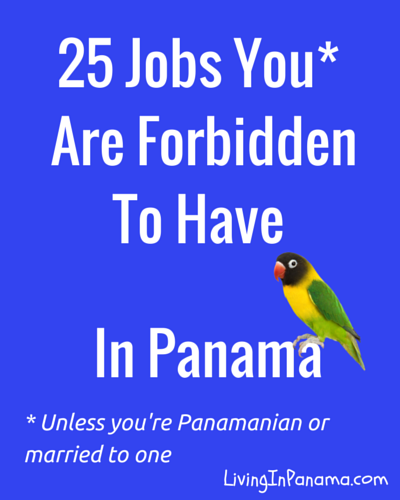
Medicine, Law, Accounting & 22 other professions that cannot be practiced by Expats in Panama
Panama prohibits foreigners from holding 25 specific professional and quasi professional jobs.
No matter which type of work permit you get, it is rare that it would allow you to work one of those jobs
The only exception is if you are married to a Panamanian.
Of course, some expats do practice at least some of these jobs under-the-table. But they are taking a risk doing that.
- Dentist
- Dental assistant
- Lawyer
- Veterinarian
- Chiropractors
- Medical, including
- Therapists, such as
- Social worker
- Accounting
- Hairdressing and Cosmetology
- Chemist
- Engineering and Architecture
- Agricultural Sciences
- Journalism
- Public Relations
- Economist
Find out the truth about life in Panama. Sign up for our monthly newsletter.
By this man’s reckoning, if he is really lucky, and the traffic cop who pulls him over is just looking for a free lunch, he might get away with paying as little as $5 to the patrolman.
He prefers this to waiting for the cop to write out a ticket.
And getting a ticket means my neighbor will then have to drive to the Chiriqui Mall in David to pay the ticket, waiting in what could be a long line, and then shelling out the $58 fine.
Learn how to pay a traffic ticket in David by clicking here
Paying this little “mordida” ( “Bribe” in English) to a cop might seem like a little thing.
After all, the whole #@!^%#!! country is corrupt anyway, right?
However, when we participate in corruption, at any level, we are not doing ourselves or others any favors.
1st of all, we are not being honest.
It is interesting, but being honest really is a means, as well as an end.
Paying your traffic ticket is its own gift. Life is simplified. You can relax and breathe easier.
The whole world feels like a safer, saner place. Panama is definitely more beautiful, when don't play the bribe game.
When you move down to Panama, you are likely to run into fellow expats who have lived here for awhile, and want to “teach you the ropes” before you are "taken advantage of" by some "corrupt Panamanian."
There is lots of great advice out there, including learning ways not to be fooled as a “newbie”.
However, if some seasoned expat explains to you that “you are in a corrupt society, and you need to protect yourself by playing the game yourself”, you should take a moment. Pause… Breathe.
Ask yourself if you are interested in keeping the cycle of corruption going, merely to save a few bucks.
In the long run, if you are a dishonest expat, you will wind up in far more trouble with the law, and with the society here, than if you are a dishonest Panamanian.
Panama has massive corruption, but mostly at the political/legal level.
You can see evidence of this every day in the newspapers here. For instance, ex-president Ricardo Martinelli trying to defend the vast corruption that permeated every fibre of his recent administration.
Meanwhile, in one’s personal dealings with “regular” Panamanians, there appears not to be too much corruption.
When you talk to your neighbor, he will tell you the truth, well at least as often as your neighbors "back home". During the course of your normal and routine activities you will be untouched by corruption.
Also beware a few fellow expats.
It is not only corruption by politicos you have to look out for, but by expat businessmen.
A few expats come to Panama to take advantage of its bureaucratic and judicial corruption. They use it as one of their business tools.
Let me emphasis, this is not the case for most expat business people, only for a few.
In many cases, these folks are pulling out of a failed investments "back home", and transferring their remaining funds to Panama in hopes of recovering their lost assets.
In our life, it had been these "corrupt" expat businessmen who purposely manipulate Panama's already corrupt legal and administrative system that have caused us grief.
Don't pay bribes. To cops or others.
If you are stopped by a policeman, just take the ticket.
If you give the cop $10 so you can move on with your day, that cop is much more likely to stop more people in the hopes of scoring $10 or more from each one.
Don't try to manipulate the system.
Of course, you have to acknowledge that others may, you should protect yourself from that. But by participating you are not helping yourself in the long run.
Once you start paying bribes, people start to know you will pay a bribe.
You are then a mark. There will be start to be all sorts of "problems" in your life that you are told can be solved with a little monetary lubrication.
By moving to Panama, you find that you have much more free time. And also much more influence upon others.
Historically, Panamanians have respected and trusted North Americans. Despite the brief, yet rough period of the “upheaval” years, and the burning of the American flag, as well as the coining of the expression “Gringo” to refer to north Americans soldiers, by extension, all US citizens. By and large, Panamanians admire North Americans.
It is a little hard to handle just how much we are admired here. It’s a bit like being a movie star. They respect our supposedly higher level of culture, education, experiences, and yes, our income. It could be mostly our higher incomes. This is particularly true in our town of Puerto Armuelles; since for most of its history it was an American-created company town.
Due to this intrinsic respect, Panamanians, particularly poor Panamanians, often look to us to lead, and to help them solve their problems. Rather than let our new status here go to our heads, and ruin us, we can do something useful with our influence.
Panama is a tiny country, with a population of about 3 million. With the influence that the average expat here is capable of commanding, we can participate in shaping the future of this tiny, precious nation. This means participating with Panamanians on a positive, daily basis. Above all, this demands that we not participate in, and thus contribute to, corruption in this young democracy.
In the end, it will help each of our lives down here in this “tropical paradise” be happier. Isn't that one of the reasons we are here, to be happy?
Updated March 2017
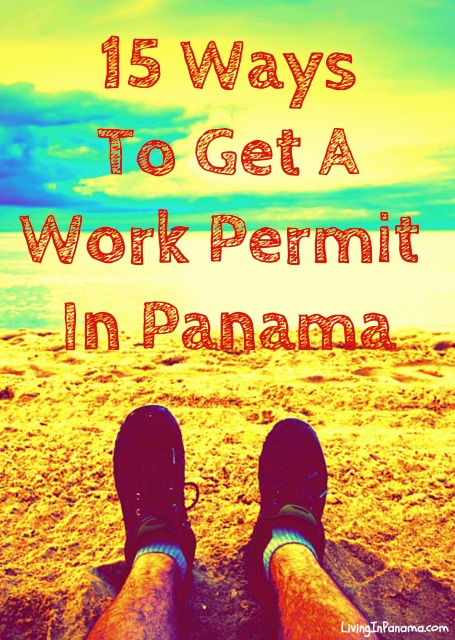
Getting A Friendly Nation Visa Makes Getting A Work Permit Much Easier
Keep in mind you can legally work in Panama, and not get a work permit, if your income comes from outside Panama.
For more info, go to how to make money in Panama.
You should consult an attorney to ensure you know about any new or modified work permit options.
I used a number of sources for this information. The 2 main sources are listed at the bottom of this page.
If that is the case, you (the foreigner) can be hired, since the company is under the maximum threshold (10%) for foreign employees. But they must pay you at least $850 per month. You can work for them for a maximum of 6 years. However, you still have to apply for a work permit. Your permit cannot be used at a different company.
The City of Knowledge is located inside the former U.S. Army Base of Fort Clayton in Panama City. Foreign investors owning a company located within Panama’s City of Knowledge can have 5 special work permits for their foreign employees. This work permit is for up to 6 years for foreign businessmen, researchers, professors, students, and technicians. For the City of Knowledge website & its list of job opportunities, go here.
After you marry a Panamanian you can apply for a work permit.
This visa was created to help ease the lack of skilled workers in Panama, and therefore, friendly nations visa holders had a fast track to a work permit. However, that all changed in early 2017. Now Friendly Nations visa holders can only get a work permit if they are hired by a qualified Panamanian employer.
Read more about updated information on work permits for Friendly Nations Visa holders.
Under this new work permit category, which is exempt from quotas and local sponsorship requirements, there is no minimum level of professional experience that the applicant must possess. Applicants must hold a bachelor's or post-graduate degree. The Highly-Skilled Worker Permit can be renewed annually. After two years, the work permit holder can apply for permanent residence.
Based on a treaty between Panama and Italy, work permits are now available to Italian nationals. The Italian National Work Permit is exempt from quota and local sponsorship requirements and will be issued with indefinite validity.
Parents of children, who were born in Panama and are at least five years old, are eligible to apply under this new work permit category. The work permit can be renewed annually, and after two years, the permit holder may apply for permanent residence. This work permit is also exempt from quotas and local sponsorship requirements.
A company must apply for special treatment/exemption above the 10% maximum quota. Again, they must pay you at least $850 a month with a maximum stay of 6 years.
This is a relatively new visa that comes with a work permit for a maximum of 9 months. The National Service of Immigration will create a registration of businesses dedicated to activities of specialists inside the Republic of Panama. No one knows what a “Specialist” is until the immigration department issues rules and regulations defining what type of job titles or functions qualify as being “special”. Due to the 9 month maximum stay; this is intended as a temporary specialist position.
Immigration law allows companies to hire a foreigner to work for a single occasion carrying out cultural, technical, musical or artistic, sports, educational field, professional, or scientific work. This visa is for a maximum of 3 months.
This is a new immigration law allowing a Panamanian citizen, or a permanent or temporary resident, to hire a foreigner to work as a domestic worker. This includes maids, cooks, chauffeurs, gardeners, nannies and butlers. The employee can then apply for this Panama Foreign Domestic Workers Visa. It is good for one year and can be renewable four times.
These visas are also new and allow for up to a 9 month stay. This visa/work permit applies to foreigners who want to establish business subsidiaries; investigators and scientists conducting research for embassies or governments or foreign businesses; investors or businessmen entering Panama to analyze investment possibilities or to perform transactions in the Food Processors Zone for Export, Call Center, or special areas appointed for the development of the Audiovisual and Film Industry.
treaty is for temporary workers intending to live in Panama for a maximum of 5 years. This visa is only available to companies employing between 3 to 10 employees earning at least the minimum wage. Only one foreigner is allowed to be employed and they must be paid at least a $1,000 a month.
This permit is another new immigration law allowing a foreigner to live and work here for 6 years. It applies to an employee of the government, semi-autonomous companies, small business contracting with the government, executives or management for a Colon Free Zone company, non-diplomats working for a foreign government or international agency or news media correspondents.
This is a new immigration visa providing temporary residency for 6 years for all employees in the film or audiovisual industry, including producers, directors, actors, and technical support; Panama Canal workers; Panama-Pacifico Special Economic Area workers (like the former Howard U.S. air force base); Foreigners hired by businesses inside the Food Processors for Export Zone; Foreigners employed by Call Centers for commercial purposes; Foreigners hired as executives for an international business with a subsidiary in Panama.
Click here for how to find a job in Panama.
If you get a Pensionado visa, you are not permitted to work. By getting that visa, you are declaring to Panama that you are retired. For more information on the Pensionado visa, go here.
If you want to legally work, you should not a get a pensionado visa. I have written about the 4 most common types of Panama visas.
Don't worry, once you are 60, if you are a man, or 55 and a woman, you will get all the benefits of a pensionado visa, regardless of what type of visa you have.
Sources:
11 of these ways are listed on Panama-Off shore Services website.
3 more ways were list on faegrbd.com.